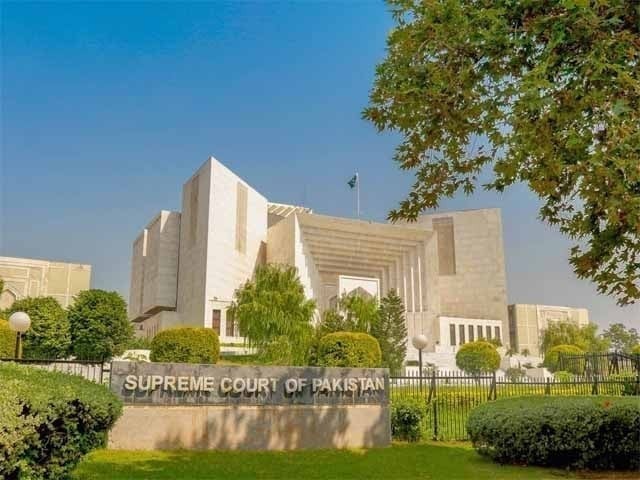ISLAMABAD: Senior lawyer Chaudhry Aitzaz Ahsan and the Lahore High Court Bar Association (LHCBA) moved the Supreme Court (SC) on Tuesday seeking an investigation into the allegations of spy agencies’ interfer-ence in judicial proceedings. Ahsan urged the apex court to establish a three-member commission comprising sitting judges of the SC “to determine the officers and operatives of the ISI or other persons, if any, are or were involved in such unlawful acts and to report its finding to this [Supreme]Court”.
Last week, six judges of the IHC – Justices Mohsin Akhtar Kayani, Tariq Mehmood Jahangiri, Babar Sat-tar, Sardar Ejaz Ishaq Khan, Arbab Muhammad Tahir and Saman Rafat Imtiaz – penned a letter to the Supreme Judicial Council (SJC), expressing their concerns about the “interference” of the intelligence agencies in the affairs of the court.
He sought directives for the federal government to dismiss individuals implicated in “unlawful acts”, with no entitlement to retirement or other benefits from the national treasury. For those who have already retired, it specified the cessation of any retirement or associated benefits.
Ahsan urged the federal government to enact necessary regulations to fulfil the clauses of the peti-tion.
His petition referred to Article 184(3) of the Constitution to question the matter of public importance in the six IHC judges letter case.
“Without prejudice to the provisions of Article 199, the Supreme Court shall if it considers that a ques-tion of public importance concerning the enforcement of any of the Fundamental Rights conferred by Chapter 1 of Part II is involved, have the power to make an order of the nature mentioned in the said Article,” the petition read.
Referring to 184(3), the petition contended to investigate whether judges at different levels of the judiciary, including high courts and district/special courts, were being influenced by the ISI or the exec-utive, as indicated in the judges’ letter. It also contended to investigate whether there was an ongoing strategy within the executive, facilitated by intelligence agencies to intimidate sitting judges. Lastly, it questioned the existence of legal guidelines defining the ISI’s jurisdiction and accountability
Aitzaz pleaded to the federal government to ensure that the prime minister, the chief of army staff (COAS), and the director general of the ISI issue an immediate written directive to all personnel under their authority, instructing them to disregard any orders, whether verbal or written, that seek to inter-fere with ongoing judicial proceedings or influence judges.
“Warning them of the consequences of failing to do so,” it reads.
Per the petition, Aitzaz has further sought for the aforementioned directives to be made public by be-ing published on the official websites of the government.
The Lahore High Court Bar Association (LHCBA) also submitted a petition urging the SC to commence an inquiry into the concerns raised in the letter penned by the six IHC judges.
The Lahore bar pleaded, “Direct holding of judicial inquiry by the judges of the Supreme Court of Paki-stan into the allegations contained in the letter of six Hon’ble Judges of the Islamabad High Court.”
The bar’s petitioned to impose stringent penalties on individuals proven guilty of attempting to intimi-date, influence, or interfere with the functioning of the judiciary in any capacity.
The petition referred to Article 209 of the Constitution, “vast and empowers SJC to provide protection to judges and to look into the complaints and make recommendation for proceedings including to the Supreme Court of Pakistan concerning the independence of the judiciary.”
“Lack of trust in public institutions engenders autocracy and threatens democracy,” the petition reads.
The petition further said that the issue highlighted in the letter from the judges of IHC concerns a fun-damental constitutional principle, “the independence of the judiciary.” It quotes that this principle has been recognized as a cornerstone of the constitution, as established in PLD 2015 SC 415
Following consultation with Chief Justice of Pakistan (CJP) Qazi Faez Isa and other senior apex court members after the letter was written, the federal government, on March 30, appointed former chief justice of Pakistan Tassaduq Hussain Jillani as the chief of an inquiry commission tasked with probing allegations that the county’s intelligence agencies are meddling in the affairs of the Islamabad High Court (IHC).
However, two days later, on April 1, Jillani recused himself from heading the inquiry commission tasked with investigating allegations of intelligence agencies meddling in the affairs of the Islamabad High Court (IHC).
In a quick turn of events, in response to Tassaduq’s recession, the SC took suo motu notice of a letter written by the six judges. –Agencies




